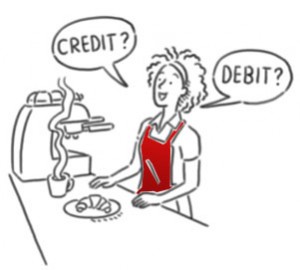
In today’s world, where plastic is the most popular mode of making financial transactions, it’s important to know the difference between credit and debit cards. Both are designed to facilitate purchases and payments, and it’s a rare American who doesn’t have at least one of each in his or her wallet. But there are some intrinsic differences that should guide which one you reach for in a particular instance.
Credit Card Purchases
A credit card allows you to temporarily borrow money. Generally that’s the bank or institution that issued the card and you may have to pay interest for the privilege. If you pay your bill off every month you may not have interest charges. You will have some type of fraud protection and if you don’t have cash in the bank, you may have to use credit.
Prompt payment of credit card debt can have beneficial side-effects. Paying on time, staying within credit limits and paying more than the minimum payment can improve your credit rating. That could translate to low interest rates on loans and credit cards. That’s helpful when the big-ticket purchases such as a mortgage or auto loan are on the line.
Some credit card issuers offer grace periods so you can sidestep interest as long as you pay in full each month. Reward points that can be applied to such things as airline miles and hotel stays are awarded by others to their best customers. Some cards have a cash-back offer for on-time payers. Other “perks” may include travel insurance or purchase protection. If you’ve used your card fora large purchase and find the product is defective, having the backing of the card’s issuer may save some of the hassle in resolving the problem. Because the options are so varied from one institution to the next, it pays to know what is offered by the one with which you are doing business. Check.
The downside of credit card use is the sense of security that having such a resource engenders. In a word, it’s too easy. If you don’t keep track and act judiciously, you may find yourself in trouble. Credit card companies charge big fees for those who overstep their card boundaries. They also may apply late fees, which seem to be a common symptom of credit card over-use. It can become a very costly lapse in good judgment.
Transactions could be viewed as short-term loans. You are borrowing from the bank that issued the card to make your purchase or payment. In emergencies, such as a broken pipe in the basement or a car problem far from home, when you haven’t the cash to resolve the situation, a credit card is mighty handy to have. Or when a necessary item is too expensive for a one-time payment, that’s when credit should be (judiciously) used.
Debit Card Purchases
A debit card, on the other hand, is tied to your own checking account. The money you are spending with your card comes directly out of your checking or savings account. No interest is attached but you should have cash in your account to cover your transaction.
The benefits of a debit card include ease of purchasing. The card becomes a substitute for cash, so you don’t have to carry cash with you. Purchases and payments are easy to track because you have access to your online checking account. Or you can check your balance at an ATM. It is simple, too, to access cash at an ATM with your debit card, as long as there is money in your account to back your request.
The downside to debits is that if you are not careful about keeping sufficient money in the supporting account, your card may be denied. Some banks allow overdrafts, but charge a fee, which cancels out the interest savings. Be aware of the policies at your financial institution.
Debit Cards That Process As Credit Cards
With debit cards you can also have the transaction itself processed through the credit procedure. When you choose this option, the merchant pays the credit card company for processing the transaction. That can cost the merchant money which can be recouped in higher prices charged to the customer. The advantage for you choosing credit is that usually that takes several days so you have a little time to get money into your account.
About The Usage Of PINs
Many stores allow the option of using your PIN to get cash as you are shopping and there is usually an ATM close at hand, so the debit card option is handy. Remember that using your own bank’s ATM avoids the fee that is charged at “generic” ATMs or those attached to other banks.
The card offers some security. Even if you should accidentally leave it at the place where you are doing business or lose it in the haste of everyday living, anyone who picks it up is not likely to be able to access your account because of the PIN requirement. That makes safeguarding your PIN very important. It is possible in some instances to bypass the PIN, so fraudulent use is not totally out of the question. The same cautions you would apply when using cash should apply here. Be careful. Most banks have fraud protection policies in place to help when things go wrong.